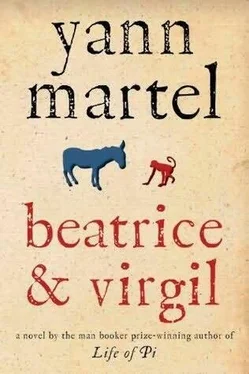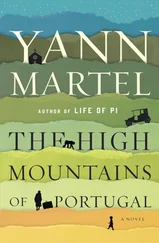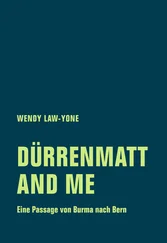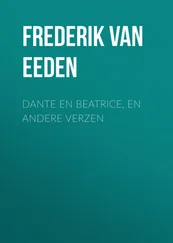Yann Martel - Beatrice and Virgil
Здесь есть возможность читать онлайн «Yann Martel - Beatrice and Virgil» весь текст электронной книги совершенно бесплатно (целиком полную версию без сокращений). В некоторых случаях можно слушать аудио, скачать через торрент в формате fb2 и присутствует краткое содержание. Жанр: Современная проза, на английском языке. Описание произведения, (предисловие) а так же отзывы посетителей доступны на портале библиотеки ЛибКат.
- Название:Beatrice and Virgil
- Автор:
- Жанр:
- Год:неизвестен
- ISBN:нет данных
- Рейтинг книги:5 / 5. Голосов: 1
-
Избранное:Добавить в избранное
- Отзывы:
-
Ваша оценка:
- 100
- 1
- 2
- 3
- 4
- 5
Beatrice and Virgil: краткое содержание, описание и аннотация
Предлагаем к чтению аннотацию, описание, краткое содержание или предисловие (зависит от того, что написал сам автор книги «Beatrice and Virgil»). Если вы не нашли необходимую информацию о книге — напишите в комментариях, мы постараемся отыскать её.
A famous author receives a mysterious letter from a man who is a struggling writer but also turns out to be a taxidermist, an eccentric and fascinating character who does not kill animals but preserves them as they lived, with skill and dedication – among them a howler monkey named Virgil and a donkey named Beatrice…
Beatrice and Virgil — читать онлайн бесплатно полную книгу (весь текст) целиком
Ниже представлен текст книги, разбитый по страницам. Система сохранения места последней прочитанной страницы, позволяет с удобством читать онлайн бесплатно книгу «Beatrice and Virgil», без необходимости каждый раз заново искать на чём Вы остановились. Поставьте закладку, и сможете в любой момент перейти на страницу, на которой закончили чтение.
Интервал:
Закладка:
"I have to go," Henry said. "I'll come back again soon."
The taxidermist said nothing. It was as if Henry weren't even there. Henry turned, left the workshop, picked up the end of Erasmus's leash, and walked out into the late afternoon.
The next weeks were some of the most intense and chaotic Henry had ever known in his life.
The Greenhouse Players were in the run-up to their next play, one in which Henry was reaching his modest acme as an actor. He was playing the lead role in Lessing's Nathan the Wise.
The Greenhouse Players had existed for more than twenty years as local purveyors of broad farces when a new director came on board and transformed the company. In a stroke, the coarse, the facile and the conventional were banned. "Why leave all the good stuff to the professionals?" he asked. "Great theatre is for everyone." That greatness could be seen as much in the flawed attempt as in the polished success, he argued. It was a potential recipe for disaster, and indeed there were surely, in the early days, shows that were more fun for the players than for the spectators. But what was the risk? Everyone participating did it for nothing, for the simple joy of being theatrically creative.
The director was an old Serbian immigrant-he called himself a Yugoslav-and he was animated by an unwavering faith in the dignity and equality of all, a positive relic of communism. He had a vision and he pursued it. He possessed the unerring ability to find the actor in each person he directed, with the point being not to erase the person behind the role but to merge person and role, so that they were balanced. "Don't worry about being good," he used to tell the troupe. "Aspire to be authentic." Casting was entirely age-blind, colour-blind, accent-blind, body-shape-blind and, when it was not directly relevant, gender-blind. This was theatre of the people, by the people, for the people. It had to be seen to be appreciated.
Under his firm yet fair guidance, the Greenhouse Players rose in the world's-that is, the city's-estimation. The widely read weekly city entertainment magazine had once done a feature on the Players-"Exalted Amateurism," the piece was titled-and they regularly attracted the notice of community media. All agreed that it was a serious endeavour and a fascinating, ongoing sociological experiment. As a result of the publicity, the spectator base had expanded to include a good number of university students-as much of sociology and cultural studies as of literature-as well as theatre lovers and the usual suspects of family and friends.
These developments all took place before Henry's time; the Greenhouse Players were already well established when he joined the troupe. They were one of the reasons he didn't want to leave the city. He loved sitting in a circle of chairs on a bare stage with fellow actors as they worked their way through a script. The trust, the fraternity, the joy!
Henry was very focussed on the upcoming production. But he did not forget the taxidermist. His thoughts regularly returned to animals and the "irreparable abomination" being done to them and the drama the taxidermist wanted to make of it.
Henry and Sarah had their own reasons to dwell on the suffering of animals. Henry came home one day and was surprised not to be greeted by Mendelssohn, their cat. She normally appeared at the end of the hallway when she heard the door open, her tail raised in the air shaped like a question mark. Nor did Erasmus show up, sniffing wildly. Sarah was sleeping-and a pregnant woman's sleep is sacred-so Henry quietly went looking for Mendelssohn. He looked under the sofa, which was her normal refuge. She wasn't there. Finally it was a smear of blood near a bookshelf that led him to her. She had jammed herself between the floor and the lowest shelf. Henry clucked and called her name in a whisper. She gave out the feeblest meow. When she crawled out, her nose was dripping blood and her back was covered in it, the skin torn and the fur matted, and she didn't seem able to stand on her back legs. Since she was a house cat, barring a freak accident, there was only one possible source of the injury: Erasmus. That answered Henry's question about how they would get along (but they did get along for the longest time, and why shouldn't they?).
Erasmus had been behaving a little strangely recently, Sarah and he had noticed. Henry turned his head and saw Erasmus across the room. The dog wasn't right; Henry could see that straightaway. And it wasn't feelings of guilt at attacking Mendelssohn or anxiety at the prospect of punishment. It was something else. Henry called him three times in a gentle voice. Erasmus wouldn't come. When Henry got closer, the dog growled. Suspecting something might be wrong, Henry put on a coat and thick gloves and caught the dog. Erasmus put up a raging fight, snarling and barking as he'd never done before. Sarah woke up screaming. Henry yelled at her not to come out of the bedroom. He noticed that Erasmus had scratch marks on his face; Mendelssohn had defended herself. When Henry had the dog wrapped in a towel in a chokehold, he called out to Sarah. She gathered up poor Mendelssohn and put her in her travelling case.
Henry hauled the two animals to the vet in a taxi. Sarah wanted to come, but they agreed that in view of her pregnant condition and the dog's strange behaviour, it was best if she stayed home.
How their dog, who was supposed to have been vaccinated, caught rabies , which turned out to be the diagnosis, was a question that neither the vet nor the shelter where they had got him could answer. There are all kinds of wild animals in big cities that have rabies, he was told. Worse even: the plague. But proper sanitary conditions prevent the spread of these diseases and they don't normally jump to pets. Perhaps the vaccine had failed. Henry wondered if Erasmus could have contracted rabies at the taxidermist's store. The notion was ridiculous; nonetheless, it trotted in his head.
Mendelssohn's back was broken and her lungs punctured, clearly as a result of a bite by Erasmus. She was in great pain and she had to be put down. One of her forepaws was shaved and while Henry held her on the table, the vet pricked the bald patch of skin with the needle. She didn't struggle. She was trusting. The instant the vet pressed on the syringe plunger, the light went out in Mendelssohn's eyes and her head fell forward.
Erasmus's end was a harsher affair. In the frenzied state the dog was in, Henry was told to release him into a large sealed box that had a window. The vet's exact diagnosis came later, after an autopsy. The initial one, the one that sealed Erasmus's fate, was based on a visual inspection through that window. Erasmus was at first violently frantic, barking and growling and hurling his snout against the window, trying to bite observers through it, completely unrecognizable in character, but after a while he curled up on the floor like his old self, only trembling and whimpering. The slight wheezing sound of the gas set him off again. He jumped up in a last mad lunge of anger. But the gas was quick, though not as quick as Mendelssohn's needle prick, and he fell over, mouth frothing, eyes rolling and legs trembling. By the time Henry was allowed to hold him again, Erasmus was completely stiff.
Henry managed to hold it together at the clinic. He was alone among strangers, there was a procedure to follow to establish a diagnosis, there were decisions to be made, a bill to be paid. In the taxi back home, he just stared out the window, numb. It was climbing the stairs to their apartment, feeling the emptiness at his feet where normally there would have been a dog, feeling the emptiness of his right hand where normally there would have been a leash, that he broke down. It took him long minutes before he could put the key in the door and let himself in. He was dreading having to tell Sarah what had happened. She was carrying a life within herself, and sensitive to life, worried about life.
Читать дальшеИнтервал:
Закладка:
Похожие книги на «Beatrice and Virgil»
Представляем Вашему вниманию похожие книги на «Beatrice and Virgil» списком для выбора. Мы отобрали схожую по названию и смыслу литературу в надежде предоставить читателям больше вариантов отыскать новые, интересные, ещё непрочитанные произведения.
Обсуждение, отзывы о книге «Beatrice and Virgil» и просто собственные мнения читателей. Оставьте ваши комментарии, напишите, что Вы думаете о произведении, его смысле или главных героях. Укажите что конкретно понравилось, а что нет, и почему Вы так считаете.












